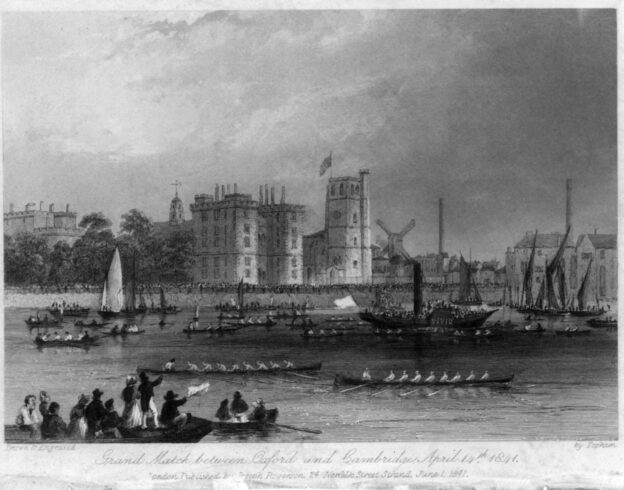The annual Oxford and Cambridge Boat Race is coming up on Sunday. Will Oxford take the trophy back from Cambridge, who were victorious in their latest row-off last year? Tension is mounting in the historic rivalry between the famous British universities – and today it goes beyond the coxes and crews and the battle of the Blues. As reported this morning in the Cambridge Herald, Cambridge University has announced its introduction of the “Cambridge comma.” Rivaling the contentious Oxford comma, which – after the apostrophe – is probably the most divisive punctuation mark in the English language (see Glossophilia’s earlier post on the Oxford or serial comma here), the Cambridge comma introduces a punctuated pause AFTER the word “and“ in lists — i.e. before the final list item, with Oxford already having staked its claim to the prime position before the “and”.
An example of the new Cambridge comma illustrates the unexpectedly belated verbal interruption that it offers: “He packed up his books, cigars, teddy bears and, slippers.” Oxford’s remains more predictably timely: “He packed up his gowns, pipes, long-johns, and ties.”
Oxford and Cambridge have enjoyed an infamous but healthy rivalry for centuries, dating back to when they were the only two universities in England and Wales. Competition between the “Oxbridge” institutions is most famously characterized by the annual boat race, which takes place on a four-mile stretch of the River Thames. Now the colleges will have one more thing — in addition to the best cox and crew, the most famous alumni, the best academic ranking, the most renowned theatrical society — over which to compete: the relative value of their respective serial comma positions. Are you an Oxford comma kind of character, or a Cambridge comma cat?
A spokesman for Cambridge University was quoted in the Cambridge Herald remarking on this new role for the ever versatile comma: “Cambridge is proud to add a new, dynamic and, pause-worthy role to the most widely-used and abused punctuation mark in the English language. We look forward to seeing it flourish in literature, texts, DMs and, IMs as we encourage the world to take an added pause.” Read the full Cambridge Herald article here.
We didn’t see this one coming!
***


You didn’t April-fool me, I’m glad to say! But those unfamiliar with the Oxford comma will have been baffled, I suspect.
BTW, I’ve seen references elsewhere to “the Oxbridge boat race”, which is completely wrong. It may be called only “the Oxford and Cambridge boat race” or “the University boat race”, the latter being open to obvious objection. Similarly, no-one from either university would dream of calling it the ‘Varsity’, still less the ghastly abbreviation ‘Uni’. ‘Varsity’ is the name of the Cambridge undergraduate (not ‘student’, incidentally) newspaper only. But you know all this already….
When I went to school the “Oxford” comma was universally taught as the correct way to write, as it avoids many misunderstandings. Using AP style where I went to college ( William and Mary) could result in Fs. I have had editors at a content writing site use AP style checkers and suggest changes that totally changed the meaning of my work. I doubt the editors in question could even be admitted to William and Mary, much less graduate magna cum laude.
To use the example quote, my schoolteachers taught me to write it like “He packed up his books, cigars, teddy bears and slippers.”, specifically being sure not to use a comma in either of the two positions in a list. It is not ambiguous in that sentence, and if it were, then there would be other ways to resolve it. They specifically were against using the Oxford comma in lists, although they never called it that, and I had never come across it until I was well into middle age. They told me to use commas to separate subclauses and between list items, not after the penultimate member of a list. I imagine this is what the teachers were taught wherever they studied for their Cert. Ed. I think it is significant that I was educated in England and not the USA. Some say the Oxford comma was promoted simultaneously by Oxford and Harvard. AFAIK only Harvard succeeded.